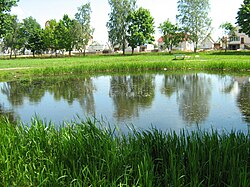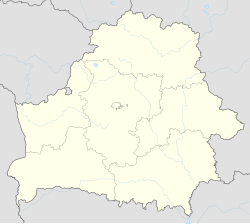Starobin, Belarus
Starobin
| |
|---|---|
 | |
| Coordinates: 52°44′N 27°28′E / 52.733°N 27.467°E | |
| Country | Belarus |
| Region | Minsk Region |
| District | Salihorsk District |
| Population (2024)[1] | |
• Total | 6,492 |
| Time zone | UTC+3 (MSK) |
Starobin (Belarusian: Старобін; Russian: Старобин) is an urban-type settlement in Salihorsk District, Minsk Region, Belarus.[2] It is situated 12 kilometres (7.5 mi) from Salihorsk and 145 kilometres (90 mi) from the capital Minsk.[3] As of 2024, it has a population of 6,492.[1]
History
[edit]Starobin is known from the 16th century as a part of the Principality of Slutsk within the Grand Duchy of Lithuania.[3] Following its incorporation into the Russian Empire, Starobin had a population of 496 in 1886.[3]
From 1924 to 1962, it served as the administrative center of Starobin District.[3] In 1938, it received the status of urban-type settlement.[3] It was part of Lyuban District from 1962 and then Salihorsk District from 1965.[3]
World War II
[edit]During World War II, Starobin was under German occupation from 26 June 1941 until the summer of 1944.[4] It was administered as part of Generalbezirk Weißruthenien within Reichskommissariat Ostland.[5] Prior to the war, there were 1,210 Jews residing in Starobin, making up 35.43 percent of the population.[5]
The first Aktion took place on 18–19 July 1941, according to Soviet sources, when a motorized detachment of the Wehrmacht shot 372 Jewish men.[6] Numerous mass shootings occurred during the occupation, with the 150 to 200 Jews who survived the various shootings in August 1941 being placed in a ghetto.[6] The ghetto was finally liquidated in the spring of 1943, with only one Jewish family surviving before they were murdered by the Germans in 1944 as they retreated.[6]
References
[edit]- ^ a b "Численность населения на 1 января 2024 г. и среднегодовая численность населения за 2023 год по Республике Беларусь в разрезе областей, районов, городов, поселков городского типа". belsat.gov.by. Archived from the original on 2 April 2024. Retrieved 13 October 2024.
- ^ Gaponenko, Irina Olegovna (2003). Назвы населеных пунктаў Рэспублікі Беларусь: Мінская вобласць (in Belarusian). Minsk: Тэхналогія. p. 393. ISBN 985-458-054-7.
- ^ a b c d e f Ramanovich 2002, p. 161.
- ^ Megargee & Dean 2012, pp. 1284–1286.
- ^ a b Megargee & Dean 2012, p. 1284.
- ^ a b c Megargee & Dean 2012, p. 1285.
Sources
[edit]- Megargee, Geoffrey P.; Dean, Martin (4 May 2012). The United States Holocaust Memorial Museum Encyclopedia of Camps and Ghettos, 1933 –1945: Volume II: Ghettos in German-Occupied Eastern Europe. Indiana University Press. pp. 1284–1286. ISBN 978-0-253-00202-0.
- Ramanovich, Z. V. (2002). "Старобін". Беларуская энцыклапедыя: У 18 т. Т. 15: Следавікі-Трыо (in Belarusian). Mìnsk: Беларуская энцыклапедыя. p. 161. ISBN 985-11-0251-2.

